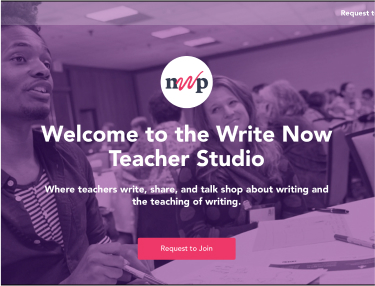Discover Content
Results for “Middle School”
MAPS Planner for Writing to a Public Audience
The MAPS planner, inspired by the work of Dawn Reed and Troy Hicks, was created as part of a collection of resources for NWP's College, Career, and Community Writers Program (C3WP). The planner is designed to support students in thinking about the specific rhetorical situation for going…
Narrowing the Lens: Teaching as Narrative Negotiation
How do competing narratives of education and writing shape the identities that teachers adopt and use to define what makes a "good teacher"? Cynthia Urbanski examines this conflict at work in her experience working as a consultant in an urban middle school.
Writing Instruction in Schools Today
Arthur N. Applebee and Judith A. Langer's Writing Instruction That Works: Proven Methods for Middle and High School Classrooms details and analyzes the state of writing in America's schools and offers a vision for how writing could and should be taught. In this chapter, the authors offer an…
A Cycle of Discussion and Inquiry
This chapter, from Thomas M. McCann's Transforming Talk into Text: Argument Writing, Inquiry, and Discussion, Grades 6-12, traces the sequence of discussions in a 9th-grade English class, as the teacher moved the learners toward writing an academic essay and reading related texts critically.
Conferencing and Literacy Desiring: Trusting Students as Writers
In this chapter from Choice and Agency in the Writing Workshop: Developing Engaged Writers, Grades 4-6, Fred Hamel explores moments of "literacy desiring," a broad and holistic term for the range of ways that students are energized by and engaged with texts. He examines what leads to these…
Digital Is...
Danielle Nicole DeVoss provides the transcripts and video of a presentation originally delivered in Philadelphia in November 2009 at a convening for the National Writing Project’s DIGITAL IS… initiative.
Motivating Boy Writers: A Multigenre Approach
Using tips from Roy Fletcher’s Boy Writers: Reclaiming Their Voices, Jeremy Hyler finds his students more engaged in their three-week research assignment once he incorporates digital tools and uses a multi-genre approach. Here he highlights the most popular genres, gives examples of student…
Disrupting the Prolonged Silence: Youth Inquiry of the Tulsa Race Massacre
Using digital tools and the power of student-inquiry, 6-12 graders explored the question, “What can we learn about the Tulsa Race Massacre to make the world a better place?” Here are field trip documents from when The Oklahoma State University Writing Project partnered with the John Hope…
Addressing Gun Violence: Creating Visionaries, Storytellers and Community Activists
When students requested to learn more about the topic of gun violence, teachers drew on the Expeditionary Learning Education Model with interdisciplinary lessons in the humanities, math, and the arts, to co-design a three-month curriculum entitled “Addressing Gun Violence: Creating…
Authentic Audiences: Movie Making and Middle School
In order to find both purpose and an authentic audience for the writing of her middle school students, Erica Blaschke assigned a contest challenge to create PSAs using iPhones, research and revision.
Student-Run Middle School Broadcast Media Program
Two teachers and their sixty-four students successfully produce their school’s daily live news show once they created a two-class section of Broadcast Media. Here are detailed accounts of how they accomplished it with tips from the students for bringing it to your classroom.
On Becoming Change Writers
For sites interested in creating opportunities to use writing and technology to connect students, teachers and community partners to explore intersections around issues of social injustice and to empower them to take social action, this curated collection of videos, images, and written words…
Write Now Teacher Studio

Where teachers write, share, and talk shop about writing and the teaching of writing
Hosted by the National Writing Project, the Write Now Teacher Studio is an open, online community of educators for educators. It’s a place to write together, examine our teaching, create and refine curricula, and work toward ever more effective and equitable practices to create confident, creative, and critical thinkers and writers in our classrooms and courses.

